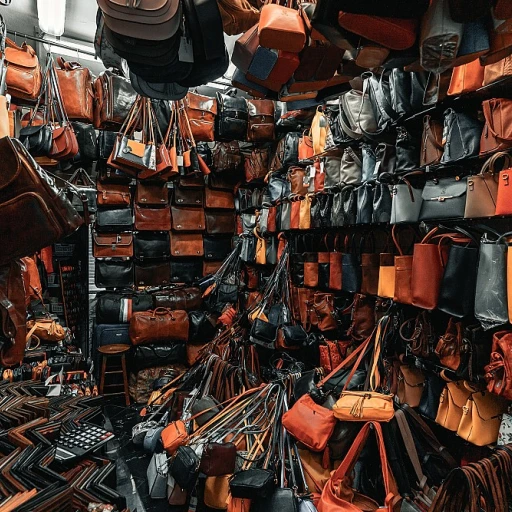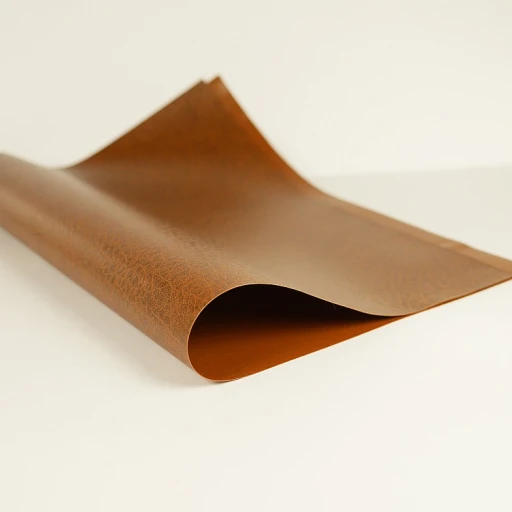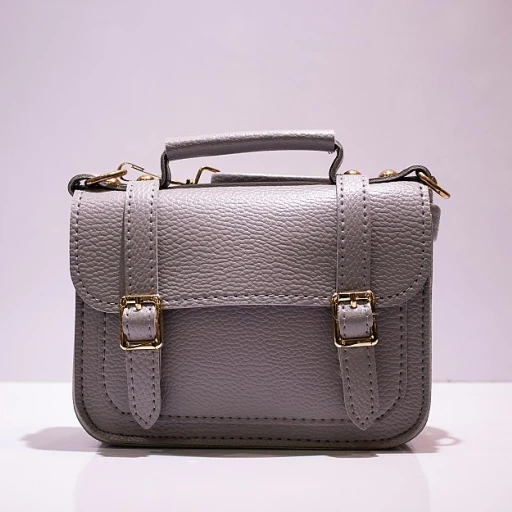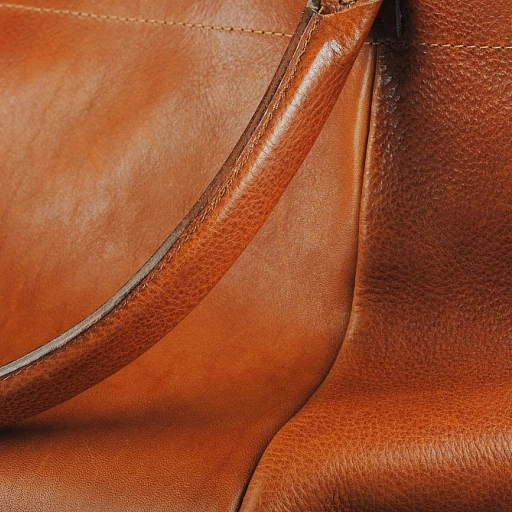The Rise of Personalization in Luxury Leather
The emergence of bespoke trends in high-end leather
In recent times, the demand for personalized products has skyrocketed, and the luxury leather sector is no exception. People are no longer content with off-the-shelf items; they crave uniqueness and a sense of identity in their purchases. According to a Deloitte study, 1 in 5 consumers is willing to pay a 20% premium for personalized or exclusive products. This striking statistic underscores the significance of personalization as a burgeoning trend in the luxury leather goods market, redefining the relationship between luxury brands and their discerning customers.
Crafting uniqueness: The heart of modern luxury
Personalization in luxury leather goods goes beyond just a name or monogram; it's about crafting a story and a connection with the product. Artisans and luxury brands are leveraging this by offering bespoke services that allow customers to be part of the design process. This not only adds a layer of exclusivity but also fosters a deep emotional attachment to the product. For example, brands like Louis Vuitton with its 'Mon Monogram' service have seen considerable engagement, demonstrating the customer's desire to leave their personal imprint on high-end goods.
The tailored touch: Integrating technology with tradition
Advancements in technology have introduced sophisticated customization tools that empower consumers to personalize their luxury leather purchases to an extent previously unattainable. These tools, when used in conjunction with the skilled hands of leather artisans, create a harmonious blend of the traditional and the modern. The luxury market has witnessed a surge in online platforms that offer 3D visualization, enabling clients to select colors, materials, and designs in real-time, thereby revolutionizing the customer experience.
Statistics speak: The undeniable allure of personalization
The numbers reveal a telling tale about the allure of personalization in the luxury leather goods industry. Bain & Company report a steady increase in the market share of personalized items, with projections suggesting it will grow to 25-30% of the market by 2025. This compelling evidence points to a future where personalization is not just a trend, but a defining characteristic of luxury leather goods, driving consumer choice and brand differentiation.
Customization Tools: A New Frontier for Artisans and Brands
Revolutionizing Traditional Craftsmanship with Digital Tools
In today’s luxury market, the digitalization of customization tools has revolutionized how artisanal leather goods are conceptualized and created. Gone are the days of one-size-fits-all; now, the power lies in the hands of the consumer who craves a unique story behind every purchase. According to a Deloitte consumer review, almost 1 in 5 consumers are willing to pay 20% more for an exclusive, personalized product. By harnessing high-end software and online platforms, artisans have found new ways to cater to this demand without sacrificing the quality and detailed craftsmanship synonymous with luxury leather goods.
- Interactive Design Platforms - Enabling customers to choose from an array of colors, materials, and hardware.
- 3D Visualisation Tools - Providing a real-time look at how the customizations transform the final product.
- Laser Engraving Technology - Adding personalized messages, initials or bespoke patterns accurately and efficiently.
Encouraging Customer Engagement through Bespoke Creations
As customization becomes a pivotal feature in the luxury sector, brands are actively leveraging this trend to enhance customer loyalty and engagement. A study by Bain & Company highlights that personalized items can increase sales by more than 25%, as customers feel a deeper connection to the brand when they’re part of the creation process. This trend is giving rise to 'co-creation' workshops where customers collaborate with designers to bring their vision to fruition, making each piece a reflection of their personal narrative and elevating the customer experience to a form of art itself.
Adapting to the Fast-Paced Changes in Consumer Preferences
In an age where consumer trends rapidly evolve, the agility to adapt to changing preferences is a hallmark of successful luxury leather brands. Personalization has the unique advantage of being both timeless and timely. It speaks to the enduring desire for quality and luxury, while also aligning with modern-day demands for individuality and expression. Data from McKinsey & Company suggests that more than 50% of luxury consumers are seeking personalized products and experiences. This has encouraged brands to continuously seek innovative customization solutions, ensuring that they remain at the forefront of the luxury market's fast-paced environment.
Bridging the Digital Divide for Artisans
The emergence of sophisticated customization tools has spurred a need for artisans to bridge the digital divide. There's a growing demand for skilled craftsmen who can seamlessly navigate these new technologies to deliver luxury at its finest. Educational initiatives and tech-focused training programs have been pivotal. Luxury giants like Hermès have long been advocates of this approach, investing in their signature craftsmanship while incorporating advanced technologies. This dual mastery ensures that luxury brands maintain their heritage and excel at innovation.
Exclusivity and Customer Experience: The Ultimate Luxury
L'art de l'exclusivité et le parcours client dans le secteur du luxe
La quête exclusive pour des produits de luxe personnalisés devient le point d'orgue de l'expérience client en matière de maroquinerie de luxe. Les consommateurs aspirent à posséder des articles qui reflètent non seulement leur statut mais aussi leur personnalité unique. Le sentiment d'exclusivité offre une valeur ajoutée considérable : selon une étude de Bain & Company, la personnalisation peut augmenter les ventes de 10 à 30%.
« La personnalisation transcende la simple possession d'un objet de luxe; elle célèbre l'identité unique de l'acheteur », souligne un expert du secteur. Les marques leaders, telles que Louis Vuitton et Gucci, l'ont bien compris en intégrant des services de marquage à chaud et de personnalisation de sacs à main dans leur offre.
Ce que les options de personnalisation signifient pour la fidélité de la clientèle
- Interaction de conception unique – Créer une connexion profonde par le choix des matériaux, couleurs et monogrammes.
- Engagement de marque accru – Une étude de Deloitte a révélé que 36% des consommateurs sont intéressés par l'achat de produits personnalisés.
- Répétition des achats – Les services de personnalisation encouragent les clients à revenir pour des designs uniques.
Les articles de maroquinerie de luxe ne se limitent plus à des options standard sur les étagères des boutiques haut de gamme. Ils sont devenus des fluides narratifs de l'histoire personnelle du client.
L'impact des éditions limitées et des collaborations exclusives
Les éditions limitées et les collaborations avec des designers ou des célébrités jouent un rôle capital dans l'augmentation de la valeur perçue des produits en cuir de luxe. Par exemple, des collaborations comme celle de Hermès avec l'artiste Apple Watch, ou la série limitée de Valentino avec Birkenstock, créent un désir immédiat et déclenchent souvent une frénésie dans la demande, avec des objets souvent épuisés en quelques minutes. L'exclusivité augmente aussi l'urgence : Lyst rapporte que les articles en édition limitée connaissent une augmentation de 140% dans les recherches en ligne.
The Economic Impact of Customization in Leather Luxe
Economic Implications of Custom Leather Crafting
The advent of personalization has created a seismic shift in the luxury leather goods market that is not merely aesthetic but deeply financial. Personalization as a service has become a significant growth driver in the industry. According to a Deloitte study, one in five consumers who express interest in personalized products or services are willing to pay a 20% premium. This presents a lucrative opportunity for brands seeking to enhance their revenue streams with customized offerings. By leveraging the allure of personalization, luxury leather goods companies can justify a higher price point, catering to clientele that values exclusivity and individual expression.
Quantified Success: The Numbers Behind Custom Luxury
Statistics underscore the economic boon of customization in the luxury leather sector. Bain & Company reported that the personal luxury goods market reached €281 billion in 2021, with bespoke experiences and products playing a pivotal role in this growth. The introduction of monogramming, engraving, and custom color palettes has enabled brands to offer a tailored experience that commands attention and wallet share. These personalized touches not only enhance customer satisfaction but also encourage brand loyalty and repeat business – essential components for sustained financial health in the luxury market.
Investing in Bespoke: A Strategic Move for Artisans
- Enhanced Profit Margins: Customized products typically have higher profit margins. The ability to charge more for personalized goods can significantly increase a brand's profitability.
- Inventory Optimization: On-demand customization allows for leaner inventory management, reducing the costs associated with overstock and ensuring resources are allocated efficiently.
- Consumer Insights: Customization options provide invaluable data on customer preferences, enabling brands to make better-informed decisions and forecast trends with greater accuracy.
It’s clear that the trend of personalizing products is not just reshaping consumer expectations but also redefining business models. Luxury leather goods brands that recognize and integrate this trend into their strategies are poised for success.
Case Studies: Personalization Profits in Action
A case in point is the renowned brand Louis Vuitton, which has seen its customized handbag lines soar in popularity. This move towards personalization not only reinforces the brand's elite status but also creates a valued connection with consumers who cherish unique, tailor-made experiences. Similarly, Hermes' bespoke services have strengthened its position in the marketplace, proving that the return on investment for customization can be substantial when executed with finesse and a deep understanding of the consumer psyche.
-large-full.webp)


-large-teaser.webp)

-large-teaser.webp)
